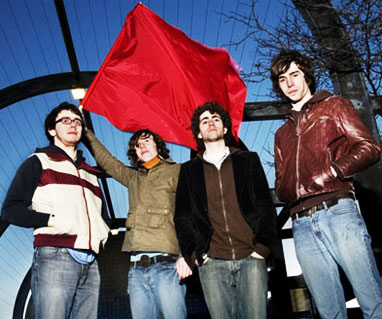With his debut solo album Paul A. Rosales creates a complex sound world that completely envelopes the listener from first track to last. With an understated guitar pushed to the background behind ever present vintage sounding synths and vocals treated through an array of varying echoes and delays that sometimes change as the songs develop, this is an album that demands the full attention of the listener. True headphone music.
The opening track, “Crimes”, introduces us at once to all of the elements that are present throughout the album: a driving, urgently attacked guitar that is made to sound less threatening by being set way back in the mix. The tone of the guitar is clean, but rounded out a bit with the help of a phaser. Synths are layered over top, taking precedence in the mix, even over the vocals. The synth tone covers everything in a wash of color similar to the retro sound of Neon Indian. It is the aural equivalent of a grainy VHS tape playing old home movies. The bass pops up between the synth and the guitar with a persistent line that wants to encourage you to dance, but the trippy vocals and disorienting drums will probably find you too out of sorts to try.
Most captivating in this wash of visceral noise are the vocals. They are made cryptic, shouting out from the back of the room, trying to reach above the din. Some of the words break through, but they are layered over each other with a good dose of delay. It is clear that Rosales is interested more in creating sounds and then manipulating them than he is in creating catchy pop hooks. The closest thing that we do get to a catchy pop tune is “She Tells Me” that is guitar driven and precariously close to having qualities that would make the listener want to sing along to the stand out line, “I fucked up, she tells me” that is repeated several times.

In “Bastard of a Man” it is startling to hear the vocals so up front and out in the open. Most of the instruments are stripped away to make room for the lyrics “Don’t give up baby/Don’t worry baby” made all the more disconcerting through a vocal approach that doesn’t settle into pitch until after the words have already been delivered. The delay on his voice in this track bounces along with the drums. He’s really in complete control of every element of the sound on this album and even more so by taking the entire sound as a whole and casting a bit of distortion and fuzz on to it as if the recording was a little too hot. Especially on “Bastard of a Man” the grittyness is amped up a little bit more than on any of the other tracks.
“Clarity Dissolve” adds some dimension to the sound with drums that were recorded to sound like they are a mile away, and the vocals are once again pushed to the back of the mix and this time sung in falsetto. The guitar is more up front, taking the role formerly held by the synths, by creating an amorphous cloud of overdriven sound. The synth line is only able to be heard in tiny bursts as if it were trying to take quick breaths.
Altering sound elements is not the only way that Rosales builds his songs. On many of the tracks the beat has a fluidity to it that creates another level of motion against the shifting color palette. Sometimes the vocal delivery is a bit relaxed and behind the beat, creating a push and pull from where one would expect a new measure to start. This is the fluid element to the song writing. That is not the only way that it is done, for example in the song “Change Faster” he swings from a steady eighth note pulse that alternates with a few bars of a metric modulation that speeds things up slightly, giving an off-kilter motion to the song.
Overall this album is a study in sound manipulation more than it is an exercise in writing standard, radio friendly songs. This album is pretty far from being radio friendly with its truly lo-fi production and all around grittyness. This is an album of experimental sound sculpture disguised as songs. There are some very interesting things going on throughout, and I would suggest giving this album the due time that it deserves to sink in and truly begin to enjoy all of what it has to offer.



